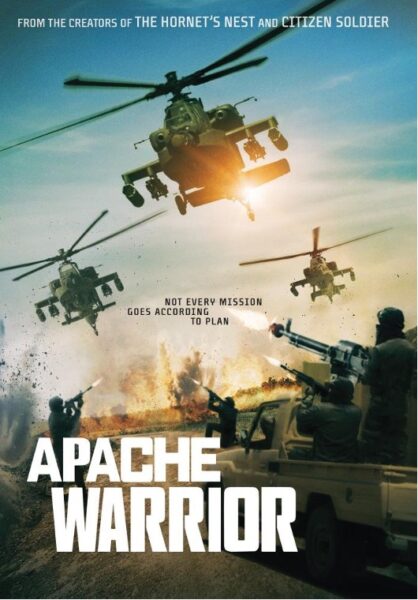It’s been said that war is the realm of uncertainty. The declaration was made by Prussian general Carl von Clausewitz in his 1832 collection of manuscripts, titled “Vom Kriege,” or “On War.” Almost two centuries later, the sentiment was revisited in the 2017 documentary “Apache Warrior,” which retells the story of an Army helicopter unit in Afghanistan for a year between 2005 and 2006.
“When I was in Afghanistan, I watched a movie [“Serenity” by Joss Wheadon] at some FARP [forward arming and refueling point] — I was on a month-long mission to support two Apaches that were providing security for a medevac team,” Lang said. “That movie kind of inspired me to take my two passions at the time — photography and theater — and to go and pursue a film.”
His film, “Apache Warrior,” received high praise in the LA Times and was ranked very high by Rotten Tomatoes.
“It kind of tells the story of the opening hours of the Iraq war, with tapes from the helicopters, so we put you in the front seat of the Apaches as they’re invading Iraq,” Lang said. “After the end credits, there is a photo montage that lists the name of every pilot that’s ever died in the aircraft up until the time that we completed the film, so it was really a tribute to all those pilots that have served.”
Lang also spent some time in Iraq during the 2003 invasion, which “didn’t really go as planned,” he said.
“So, it was a bit of an interesting situation that was always tumbling around my head, like what the hell really happened,” Lang said. “All I know is, we showed up in our helicopters, got all shot up, spent a month in the desert fixing them, and we went north of Baghdad. We spent the rest of the year in Ballad, Iraq, but it was always going back to like ‘what the hell really happened during that invasion?’”
Lang is a member of American Legion Ronald Reagan-Pacific Palisades Post 283. He grew up in Fairfield, California, because his grandfather worked at Travis Air Force Base. His grandfather joined the Army Air Corps and was transferred over to the Air Force after WWII where he retired as a master sergeant. His grandfather was a flying mechanic, a crew chief who would do all the maintenance test flights and things like that; but after a life of working in aviation surrounded by jet fuel, hydraulic fluid, and engine oil, he got cancer and died when Josh was only 2 years old.
Joshua grew up working construction for his father and had a bit of a yearning for some adventure, so he joined the Army in 2000. He was a longbow Apache attack helicopter mechanic for six years, went to Iraq in 2003 during the invasion, and did a year in Afghanistan in 2005-2006.
He describes his time as a mechanic, as having, “an awesome job, I was like a shepherd of Mechanical Dragons,” a subtle reference to his production company bearing the same name.
After leaving the military, Lang spent 10 years of working in the film industry, freelancing, going to film school, working for a company, and working at a theater. He had all the tools and equipment and everything he needed.
“And I was like ‘well, the thing that’s always been bugging me was this Apache mission that we did.’ So, I took a road trip across the country in 2016 and shot 14 interviews,” Lang said. “Shortly thereafter, I was able get a company interested. They helped me finish the film, handled the post-production and distribution.”
Lang has assisted The America Legion in the past.
“Before I was doing video stuff for the post, I was doing volunteer work when they had a need for it. When the pandemic hit and we were all locked down, they were trying to still do their meetings online; so, I came in to help out,” Lang said. “They also recently opened a park in Pacific Palisades, the Veterans Memorial Park, and I did a quick little 90-second video for them for that.”
Lang was also tapped to help Post 283 video interview a member who was a Medal of Honor recipient.
“The Legion like many organizations, is a summation of its members,” Lang said. “The Legion has an unfortunate stigma of being old, outdated, and resistant to change. I believe it is important for young veterans to get involved and champion causes that are important to their generation as well as applying their skills to help accomplish the mission relating to the four pillars of the Legion. ‘The future is what you make it, so make it a good one.’ Doc Brown said that in Back to the Future III”













